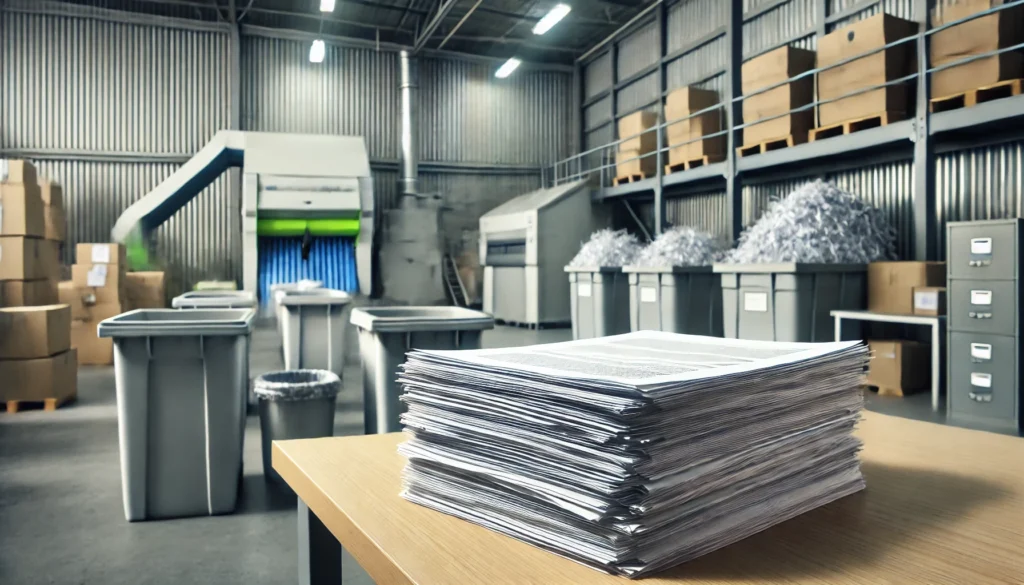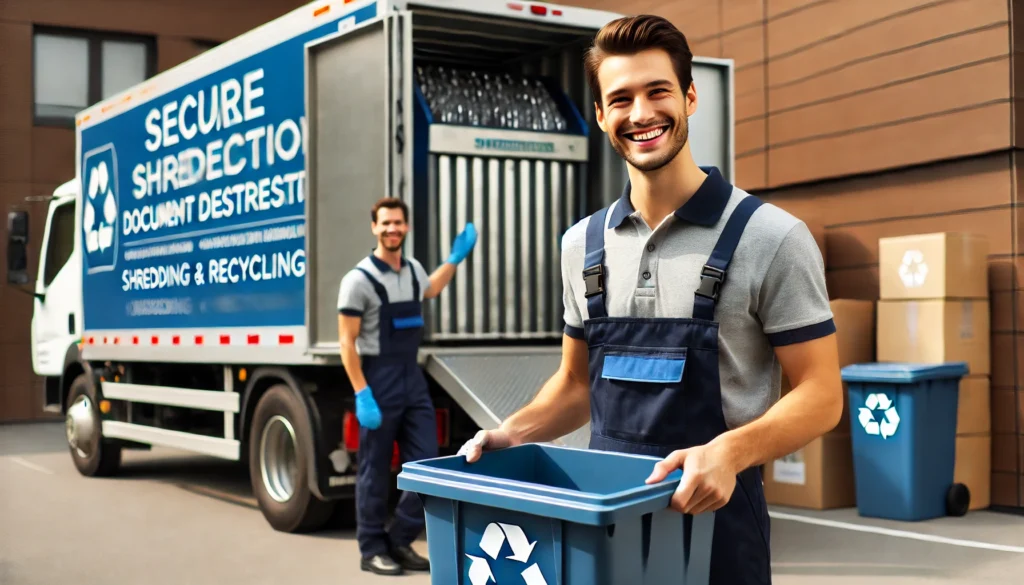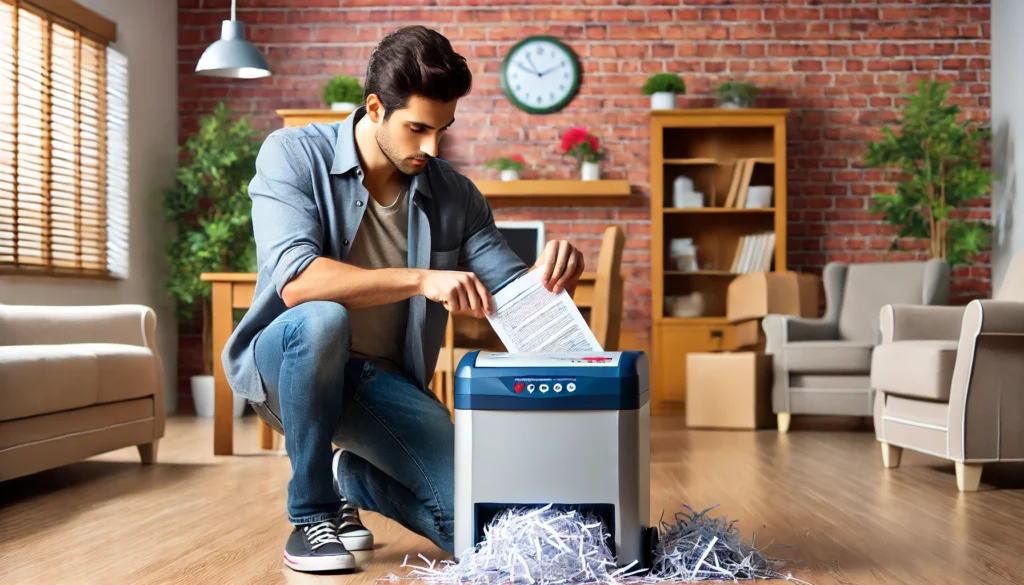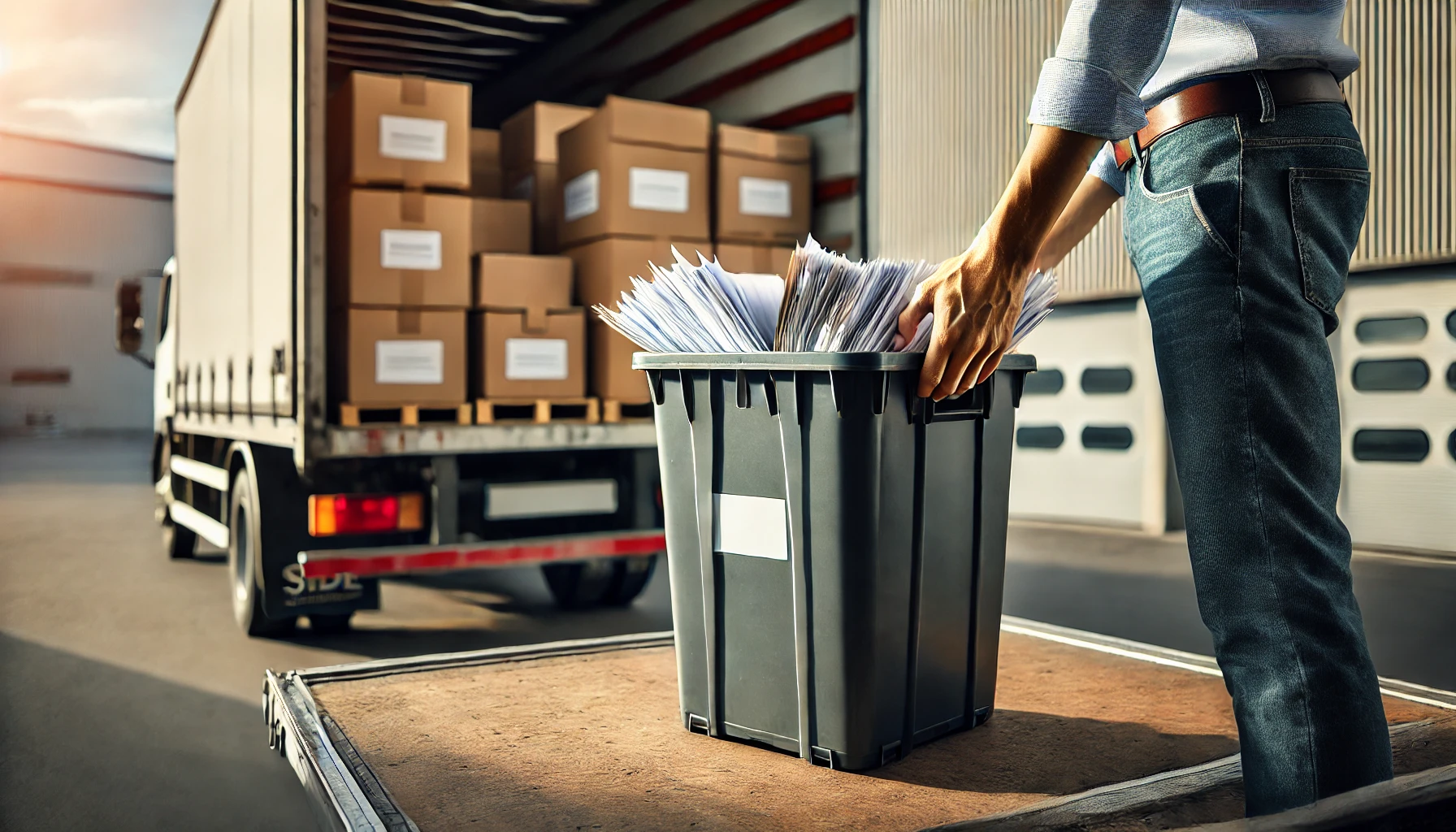Protecting your personal information is more important than ever. Discarding sensitive documents like bank statements, medical records, or tax forms without proper disposal can expose you to identity theft and fraud. Residential shredding offers a secure way to eliminate these risks by ensuring your private data doesn’t fall into the wrong hands.
So, what kinds of documents should you be shredding, and how can you do it effectively? In this article, we’ll delve into why shredding is essential for homeowners, identify the types of papers that require careful handling, and provide practical tips for preparing your materials. We’ll also compare different shredding methods to help you choose the one that best fits your needs.
Keeping your privacy intact doesn’t have to be complicated. Let’s explore some simple steps you can take to protect your personal information.
Residential Shredding: What is it and Why is it Important?

Residential shredding is an essential service that facilitates the secure disposal of sensitive documents, thereby safeguarding personal information and mitigating the risk of identity theft.
In an era characterised by frequent data breaches, the significance of residential shredding is paramount. This process entails the comprehensive shredding of various types of documents, including financial statements, tax records, medical records, and other confidential materials, thereby promoting data protection and confidentiality.
Given the increasing prevalence of identity theft, residential shredding provides a proactive solution for secure disposal while enhancing individual privacy.
Understanding the Need for Secure Document Destruction
The necessity for secure document destruction has become increasingly critical in our information-driven society, where personal data is perpetually at risk of exposure to identity theft. Effective shredding practices safeguard sensitive information from unauthorised access and ensure compliance with confidentiality standards. As individuals and organisations accumulate documents containing personal and financial details, the threat of data breaches escalates, underscoring the need for secure disposal methods to mitigate these risks.
Neglecting to properly dispose of sensitive documents can result in severe consequences, including identity theft, which has been associated with high-profile cases where individuals have lost their savings and experienced significant emotional distress. The legal implications are equally serious; mishandling personal data can lead to substantial fines and lawsuits, creating a precarious environment for companies that fail to implement secure document destruction protocols.
For instance, organisations that inadvertently expose client information during mass disposal efforts may suffer reputational damage as well as incur considerable financial penalties. By employing secure shredding services, both individuals and businesses can effectively mitigate these risks, ensuring that sensitive information is irretrievably destroyed and fostering a sense of security.
Types of Documents That Should Be Shredded

Understanding the types of documents that require shredding is essential for both individuals and businesses in order to safeguard sensitive information and prevent identity theft.
A range of documents, including financial records such as bank statements and credit card offers, legal documents like contracts and invoices, as well as medical records and personal identification papers, contain sensitive information that could result in significant repercussions if accessed by unauthorised individuals.
Implementing proper document shredding procedures is not merely a best practice; it is a critical necessity for maintaining data protection and privacy.
Sensitive Personal Information
Sensitive personal information includes data that can be exploited for identity theft, highlighting the necessity for thorough shredding to ensure confidentiality and secure disposal. This category encompasses items such as national insurance numbers, bank statements, and medical records, all of which can jeopardise an individual’s privacy if not properly destroyed.
By implementing domestic shredding practices, individuals can effectively protect their sensitive information and reduce the risk of unauthorised access.
Additionally, credit card offers and utility bills also fall into this category, as they may disclose financial habits and account information. Each piece of unshredded documentation presents an opportunity for identity thieves to impersonate individuals or commit fraud, potentially leading to unwarranted debts and damaged credit scores.
The repercussions of such breaches often involve time-consuming disputes and financial losses, underscoring the critical importance of shredding in safeguarding one’s future. By taking proactive measures to securely dispose of sensitive materials, individuals significantly enhance their security and peace of mind.
Financial and Legal Documents
Financial and legal documents are prime targets for identity theft, necessitating their secure disposal through shredding to protect personal information. Documents such as tax returns, bank statements, contracts, and wills contain critical information that, if exposed, can result in serious consequences, including financial fraud and legal disputes. Establishing a shredding routine for these documents not only enhances data protection but also promotes compliance with privacy laws and regulations.
It is also important to consider additional documents such as credit reports, mortgage paperwork, and insurance policies, as each contains significant personal data that, if compromised, can jeopardize both financial stability and reputation.
Legal obligations often mandate the retention of certain documents for specified periods, such as customer account records and business contracts, highlighting the need to balance document retention with secure destruction.
By understanding these guidelines, individuals can take proactive measures to safeguard sensitive information while adhering to legal requirements related to confidentiality and document disposal.
Benefits of Residential Shredding

The advantages of residential shredding extend beyond the simple disposal of documents; they are crucial in safeguarding against identity theft and ensuring adherence to privacy regulations.
By securely shredding sensitive documents, individuals can substantially mitigate the risk of unauthorised access to personal information, thus enhancing their identity protection measures.
The assurance derived from knowing that confidential data is securely disposed of is invaluable, positioning residential shredding as a wise investment in personal privacy and security.
Protecting Against Identity Theft
Protecting against identity theft serves as a primary motivation for implementing shredding practices in residential settings, as it facilitates the secure disposal of personal information. With the increasing prevalence of identity theft, individuals must adopt proactive measures to safeguard their data. Shredding sensitive documents, such as credit card offers, medical records, and tax documents, significantly reduces the likelihood of personal information being compromised.
Plus shredding, employing a multi-layered approach to data protection can further enhance security. Individuals should consider utilising password managers to secure online accounts, regularly monitoring credit reports for any unusual activity, and employing two-factor authentication whenever feasible.
Furthermore, educating oneself about phishing scams and other deceptive practices is essential, as these tactics frequently result in identity theft. By integrating shredding into a comprehensive strategy that includes digital security measures, individuals can establish a robust defence system against potential threats, ensuring their personal information remains protected from unauthorised access.
Compliance with Privacy Laws
Compliance with privacy laws is a critical element of residential shredding, as it ensures individuals fulfil legal obligations for the secure disposal of sensitive information. Various regulations govern the management and destruction of personal and financial records, thereby promoting data protection and confidentiality.
By adhering to established shredding guidelines, individuals not only safeguard their information but also mitigate the potential legal repercussions associated with the mishandling of sensitive documents.
In the contemporary digital landscape, the importance of protecting private data is paramount. Legislative frameworks, such as the Health Insurance Portability and Accountability Act (HIPAA) and the General Data Protection Regulation (GDPR), delineate rigorous guidelines for the management of personal information.
Non-compliance with these regulations can result in significant penalties and reputational damage. By engaging in document shredding, individuals affirm their commitment to these legal standards, ensuring that sensitive information—whether related to health, finances, or identity—is effectively rendered unreadable and unusable, thus minimising the risk of data breaches and identity theft.
Methods of Residential Shredding
There are several residential shredding methods available to address individual requirements, ranging from home shredding solutions to professional shredding services that prioritise eco-friendly practices.
Home shredding provides convenience and control, enabling individuals to manage their document disposal independently. Conversely, professional shredding services offer a more comprehensive approach, typically utilising advanced shredding machinery and secure disposal methods that adhere to environmental standards.
Options for Shredding at Home
Home shredding options offer individuals the ability to manage their document disposal efficiently, utilising various shredding machines such as cross-cut and strip-cut shredders. These devices facilitate the secure destruction of sensitive information, ensuring that personal data remains irretrievable. The inclusion of shredding bins allows individuals to maintain a clutter-free environment while protecting their privacy.
Plus these basic models, more advanced options such as micro-cut shredders provide an even higher level of security by transforming documents into tiny, unreadable fragments. This is particularly advantageous for those handling confidential information.
When selecting a shredder, it is essential to assess its functionality, including sheet capacity and run time, to ensure it aligns with personal requirements. Proper usage is also critical; feeding documents cautiously and avoiding overload can significantly extend the shredder’s lifespan. Additionally, regular oiling of the blades can enhance performance, enabling individuals to effectively safeguard their data while benefiting from the convenience of home shredding.
Professional Shredding Services
Professional shredding services provide a secure disposal solution for both individuals and businesses, ensuring the effective destruction of sensitive documents through certified processes. These services frequently include mobile shredding, which transports shredding equipment directly to the client’s location, thereby enhancing both convenience and security.
By employing certified shredding services, clients can be confident that their sensitive information is managed in accordance with industry standards and regulations.
This is essential not only for safeguarding personal and corporate identities but also for ensuring compliance with data protection laws such as GDPR and data protection regulations. Opting for DIY shredding methods may result in oversights, where critical documents are not adequately destroyed, leaving sensitive data vulnerable to breaches.
Professional services offer documented proof of destruction, providing clients with a sense of accountability and reinforcing consumer confidence in their commitment to security. The peace of mind that accompanies the knowledge that a certified expert is overseeing the disposal process is invaluable, making professional shredding not merely a choice, but a necessity.
How to Prepare Documents for Shredding

Efficient preparation of documents for shredding is essential for maximising operational efficiency and ensuring the secure destruction of sensitive information. The process commences with the systematic sorting and organisation of documents to determine which items require shredding, including financial records, medical files, and personal identification.
Developing a shredding checklist can facilitate this process and assist individuals in maintaining an organised approach to document disposal.
Tips for Sorting and Organising Documents
Effective sorting and organisation of documents are critical components of the shredding process that enhance both efficiency and security. Initially, individuals should review their document retention policies and categorise papers into those designated for shredding and those that must be retained.
Utilising a systematic approach, such as a shredding checklist, can facilitate this task and ensure that all sensitive information is properly accounted for.
Establishing a regular schedule for reviewing these documents—perhaps on a quarterly basis—is advisable to prevent the accumulation of unnecessary paperwork. This practice not only streamlines the shredding process but also ensures compliance with legal requirements by maintaining records for the appropriate duration in accordance with company policy.
Creating designated folders or bins for various categories, such as financial records, personal information, and outdated materials, can significantly enhance overall organisation. A thorough and meticulous sorting process will ultimately safeguard sensitive information and contribute to a smooth operational workflow.
Proper Storage and Transport of Documents
Proper storage and transportation of documents prior to shredding are essential for maintaining confidentiality and ensuring secure disposal. Documents should be stored in shredding bins or locked containers to prevent unauthorised access. When transporting documents to a shredding service, it is crucial to handle them with care to mitigate any potential security breaches during transit.
Utilising clearly labelled shredding bins can streamline the process, allowing individuals to easily identify which documents are ready for shredding while safeguarding sensitive materials from unauthorised exposure. It is advisable to limit access to these bins by designating specific staff members responsible for managing document disposal.
When preparing to transport the documents, employing tamper-proof bags can further protect privacy, ensuring that no sensitive information is visible at any stage. Additionally, scheduling regular pickups from a shredding service can help maintain an organised workflow while reinforcing the importance of confidentiality throughout the entire document lifecycle.
Frequently Asked Questions
What Types of Documents Should Be Shredded with Residential Shredding?
Any document that contains personal or sensitive information should be shredded with residential shredding. This includes documents such as bank statements, credit card statements, tax documents, medical records, and any other documents with your name, address, social security number, or financial information.
What if I’m not sure if a document should be shredded?
If you’re not sure if a document contains personal or sensitive information, it’s better to err on the side of caution and shred it. It’s always better to be safe than sorry when it comes to protecting your personal information.
Can I shred documents with staples or paper clips?
Yes, most residential shredders are able to handle small staples and paper clips. However, it’s always a good idea to remove them if possible to prolong the life of your shredder.
Are there any documents that shouldn’t be shredded with residential shredding?
Yes, there are some documents that should not be shredded with residential shredding. These include plastic cards, CDs or DVDs, and thick or glossy paper. These items can damage your shredder and should be disposed of through other means.
Can I shred documents with sensitive information on both sides?
Yes, most residential shredders have the ability to shred both sides of a document. However, if you have a large amount of double-sided documents, it may be more efficient to separate them and shred one side at a time.
What do I do with the shredded paper?
Once your documents have been shredded, they can be recycled with other paper products. This helps reduce waste and protect the environment. You can also check with your local recycling programme to see if they have any specific requirements for shredded paper.

